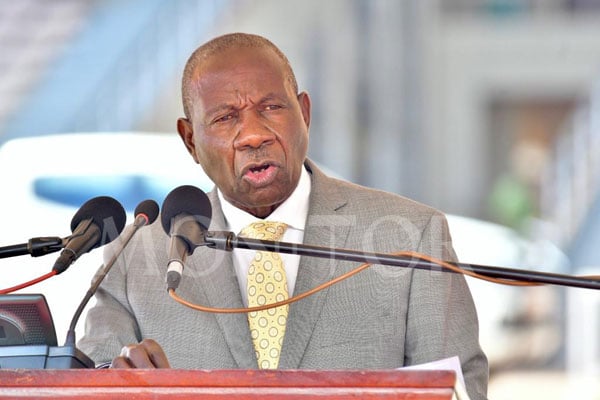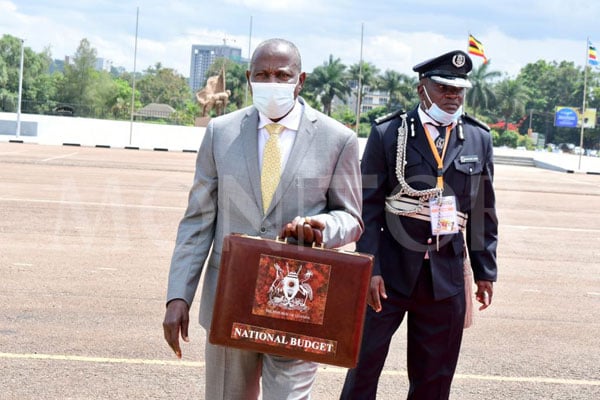
Fuel pump prices at Shell Bugolobi in Kampala by press time on June 15, 2022. Since January, prices of essential commodities such as fuel have risen exponentially. PHOTOS/DAVID LUBOWA
|National
Prime
FY2022/23 Budget: What’s in it for you?
What you need to know:
- There is no immediate relief provided to counter the rising prices for the essential commodities and services.
The Financial Year 2022/2023, just days away, will be ushered in with a revenue deficit of nearly Shs940 billion, which is almost twice the budget allocated for enhancement of medical workers, scientists, and science teachers’ salaries.
Although the Budget speech made mention of it, there is no doubt thus far that the FY2022/2023 will have to endure significant increase in prices for some of the essential commodities and services.
ALSO READ: Highlights from Kasaija’s budget speech
Since the second half of FY2021/2022, prices of commodities such as laundry bar soap, petrol and diesel, cooking oil and some food crop items, including wheat, sugar, potatoes, and onions have been on the rise.
According to the Budget speech delivered by the Minister of Finance, Mr Matia Kasaija yesterday, education services and building materials such as cement and steel have also experienced price increases, a trend expected to continue for a while, causing considerable discomfort and agitation among the public.
Worth noting is that there is nothing the government can do to halt the situation on the grounds that the increase in the prices of essential commodities is a result of events occurring outside the boundaries of Uganda.
The Budget speech delivered under the theme: “Full monetisation of the Ugandan Economy through Commercial Agriculture, Industrialisation, Market Access and Digital Transformation”, however, will be banking on the slightly more than Shs1 trillion earmarked for Parish Development Model (PDM) to trigger more than 3.5 million households into the money economy.
“Substantial resources have been earmarked for the implementation of the PDM. This model will be the vehicle of socioeconomic transformation at the parish level, and the monetisation of the Ugandan economy.
“Successful implementation of the PDM ushers in a mass socio-economic transformation movement in our society with better sustained outcomes. I, therefore, urge all leaders and Ugandans to ensure these resources are effectively used to bring about the desired change,” Mr Kasaija said in a war-like cry tone.
The Shs1.059 trillion will be spread across the 10,594 parishes in the country, with each receiving Shs100 million as a revolving fund, earmarked for purchase of agricultural inputs by households still in subsistence.
In addition to Shs200 billion made available to small and medium enterprises with special focus on women and the youth, Uganda Development Bank plans to disburse a further Shs351 billion by December for private sector enterprises engaged in strategic industrial development of the country, such as agro-processing, manufacturing, and minerals beneficiation.
Mr Kasaija said the Uganda Development Corporation (UDC) has received Shs160.7 billion this financial year to make equity joint venture investments.
Already, Shs20 billion has been disbursed to teachers’ Sacco to support them to recover from the pandemic. This is in addition to a total of Shs67 billion made available to 1,000 borrowers under the Agricultural Credit Facility.
Cumulatively, the fund has financed a total of 3,120 farmers across the country to a tune of Shs737 billion.
Following amendment of the National Social Security Fund (NSSF) Act to allow mid-term access for qualifying members, a total of Shs420 billion has so far been paid out to about 21,500 beneficiaries.
For women entrepreneurs, Mr Kasaija noted that $217 million in grant from the World Bank has been secured to provide funding in the coming financial year to middle level businesses managed by women as a way to support their growth and create jobs.
Strategy
Peace, security and stability continues to unquestionably dominate the National Budget.
In a recent supplementary budget, government provided Shs112.5 billion to facilitate the Uganda People’s Defence Forces (UPDF) to carryout operations, and the Ministry of Works and Transport to construct security roads in Karamoja sub-region.
On the back of that, a further Shs3.987 trillion has been provided for improvement of security and security infrastructure.
Judiciary gets Shs381.6 billion, Shs95 billion for the Directorate of Public Prosecutions, Shs876.4 billion for the Uganda Police Force, and Shs308.7 billion for the Uganda Prisons Service.
Another Shs79.4 billion allocation was reserved for the Inspectorate of Government.
Again, for the umpteenth time, the agriculture sector will have to settle at the lower end of the table with an allocation of Shs564.39 billion, described by sector analysts as a “joke.”

Finance Minister Matia Kasaija during national budget reading at Kololo ceremonial grounds in Kampala on June 14, 2022. PHOTO/ DAVID LUBOWA
Mr Kasaija said this allocation is meant to increase production and productivity. Importantly, perhaps, there is separate allocation to a tune of Shs628 billion apportioned for actions to mitigate and adapt to climate change.
To promote agro-industrialisation, standards and market entry, Shs1.449 trillion has been set aside for this purpose.
And for tourism activities and generally the sector that is trying to recover from the Covid-19 shocks has been assigned Shs194.7 billion to complement private sector investment and support its recovery.
With oil and gas being the talk of the town since pronouncement of Final Investment Decision (FID), Shs904.1 billion has been injected towards the development and commercialisation of minerals, oil and gas.
ALSO READ: High prices: Govt turns its back on Ugandans
The health sector, which is still largely donor-funded, even despite the grim reminder by way of Covid-19 pandemic, got a total allocation of Shs3.722 trillion for healthcare delivery, while Shs1.027 trillion was rolled towards the water and environment sub-programme.
And for education sector, it got Shs4.14 trillion mainly aimed towards the education and skilling sub-programmes.
Advancing innovation and technological development in the country settled for Shs274.4 billion, and a perennial guzzler –transport sector, walked away Shs4.3 trillion allocation mainly for transport infrastructure development and maintenance.
Towards digitalization, Shs124.2 billion was assigned and finally, salaries of medical workers, scientists, and science teachers, have been enhanced by Shs495 billion.
And to enhance the decentralisation policy, a total of Shs5.1 trillion has been provided as direct financing to Local Governments.
And to ensure that all the aforementioned programmes are implemented, Mr Kasaija disclosed that Shs1.573 trillion has been provided for this cause.
Prices
According to the Budget speech delivered by the Minister of Finance, Mr Matia Kasaija yesterday, education services and building materials such as cement and steel have also experienced price increases, a trend expected to continue for a while, causing considerable discomfort and agitation among the public.
Worth noting is that there is nothing the government can do to halt the situation on the grounds that the increase in the prices of essential commodities is a result of events occurring outside the boundaries of Uganda.






